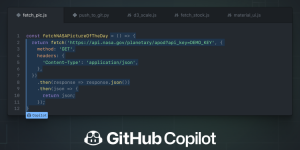Difference between revisions of "GitHub Copilot"
| Line 15: | Line 15: | ||
==Accuracy== | ==Accuracy== | ||
GitHub benchmarked against a set of Python functions that have test coverage in open source repos. They blanked out the function bodies and asked GitHub Copilot to fill them in. The model got right 43% of the time on the first try, and 57% of the time when allowed 10 attempts.<ref name="GitHub copilot"/> | GitHub benchmarked against a set of Python functions that have test coverage in open source repos. They blanked out the function bodies and asked GitHub Copilot to fill them in. The model got right 43% of the time on the first try, and 57% of the time when allowed 10 attempts.<ref name="GitHub copilot"/> | ||
| + | |||
| + | ==Achievements== | ||
| + | Until October 2021, GitHub said that there were about 30 percent of new code on its platform had been written with the support of GitHub Copilot. | ||
==Ethical Issues== | ==Ethical Issues== | ||
Revision as of 05:59, 27 January 2022
GitHub Copilot is an AI pair programmer developed by GitHub and OpenAI.[1] GitHub Copilot was designed to help users by autocompleting code.[2] GitHub Copilot draws context from comments and code, and suggests individual lines and whole functions.[1] GitHub Copilot is powered by OpenAI Codex, an AI system created by OpenAI.[1] The GitHub Copilot technical preview is available as an extension for Visual Studio Code, Neovim, and the JetBrains suite of IDEs.[1] GitHub Copilot was announced by GitHub on 29 June 2021.[3] The programing languages GitHub Copilot currently supports includes Python, JavaScript, TypeScript, Ruby, Java and Go, but also provides autocompleting functionalities on languages it does not aimed to support.[4]
Technology
GitHub Copilot is powered by a distinct production version of Codex, a GPT language model finetuned on publicly available code from GitHub, and study its Python code-writing capabilities.[5] The idea was generated from the observation that GPT-3, a language model which was not explicitly trained for code generation, can generate simple programs from Python docstrings.[5]
Copilot was trained with a repository that contains public code, made by a network of developers that exist on the GitHub platform.[4]
GitHub have put a few filters in place to prevent Copilot from generating offensive language, but the possibility of producing undesired outputs, including biased, discriminatory, abusive, or offensive outputs still remains.[1][2]
Origin
This project is a result of Microsoft's $1 billion investment into OpenAI, the research firm now led by Y Combinator president Sam Altman.[2]
Accuracy
GitHub benchmarked against a set of Python functions that have test coverage in open source repos. They blanked out the function bodies and asked GitHub Copilot to fill them in. The model got right 43% of the time on the first try, and 57% of the time when allowed 10 attempts.[1]
Achievements
Until October 2021, GitHub said that there were about 30 percent of new code on its platform had been written with the support of GitHub Copilot.
Ethical Issues
References
- ↑ 1.0 1.1 1.2 1.3 1.4 1.5 GitHub copilot · your AI pair programmer. GitHub Copilot. (n.d.). Retrieved January 27, 2022, from https://copilot.github.com/
- ↑ 2.0 2.1 2.2 Gershgorn, D. (2021, June 29). GitHub and OpenAI launch a new AI tool that generates its own code. The Verge. Retrieved January 27, 2022, from https://www.theverge.com/2021/6/29/22555777/github-openai-ai-tool-autocomplete-code
- ↑ Gershgorn, D. (2021, July 7). GitHub's automatic coding tool rests on untested legal ground. The Verge. Retrieved January 27, 2022, from https://www.theverge.com/2021/7/7/22561180/github-copilot-legal-copyright-fair-use-public-code
- ↑ 4.0 4.1 MoneyControl. (n.d.). Explained: Everything you need to know about github copilot. Moneycontrol. Retrieved January 27, 2022, from https://www.moneycontrol.com/news/technology/explained-everything-you-need-to-know-about-github-copilot-7920251.html
- ↑ 5.0 5.1 Chen, M., Tworek, J., Jun, H., Yuan, Q., Pinto, H. P. D. O., Kaplan, J., ... & Zaremba, W. (2021). Evaluating large language models trained on code. arXiv preprint arXiv:2107.03374.
